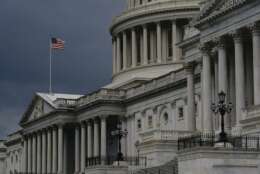Management
-
Several agencies have followed a pattern of restructuring their IT shops, embracing artificial intelligence and automation, or developing programs with less siloes.
September 22, 2021 -
In today's Federal Newscast, ten House Republicans want to know why more federal employees aren't working in person.
September 22, 2021 -
Senators on both sides of the aisle agreed the president's nominees for the Merit Systems Protection Board are experienced, and they expressed a desire to restore a long-awaited quorum to the board. But Republicans also zeroed in on past social media posts from one of the nominees.
September 22, 2021 -
The electromagnetic spectrum that our phones, radios and TVs rely on is a scare commodity and figuring out how to allocate it in the most sensible way has been a challenge for the past century.
September 22, 2021 -
Labor relations at the Department of Veterans Affairs soured a bit during the Trump administration. And they haven't gotten any better with Joe Biden in the White House.
September 22, 2021 -
The pandemic created big challenges for the nation’s immigration courts, which are used to doing business in person. Inconsistent policies and a lack of stakeholder engagement made things more difficult than they needed to be.
September 22, 2021 -
U.S. Digital Corps will bring in two-year fellows to be assigned throughout the government.
September 21, 2021 -
The House passed a nine-week continuing resolution Tuesday night, which would sustain agency operations through Dec. 3. But the CR also temporarily suspends the debt limit through December 2022, a measure Republicans have said they're unwilling to support.
September 21, 2021 -
Retired Air Force Lt. Gen. Ronald Hawkins joined Aileen Black on this week's Leaders and Legends to discuss leadership the qualities that a leader needs during difficult times.
September 21, 2021 -
Individuals doing the right thing: what a concept! It's how to keep an agency from losing its reputation
September 21, 2021 -
The Advisory Committee on Data for Evidence Building, in a meeting Friday, outlined its recommendations to create a National Secure Data Service, which would give vetted researchers access to sensitive government data for statistical purposes.
September 21, 2021 -
The service wants to downsize the number of aircraft it uses and focus on modernizing current systems and developing next generation weapons to make its top priority near-peer competition.
September 20, 2021 -
Agencies and organizations across the United States government face a five-year window to inculcate a culture of innovation, or risk failing to keep pace with emerging and disruptive technologies.
September 20, 2021 -
Besides fighting over a $3.5 trillion extra spending bill and a $2.9 trillion tax hike, there's the matter of the regular old appropriations to keep the government running.
September 20, 2021 -
As a way to "minimize disruptions," the Bureau of Land Management will not require employees, with the exception of a few core senior leaders, to move to Washington, D.C., the Interior Department said.
September 17, 2021















